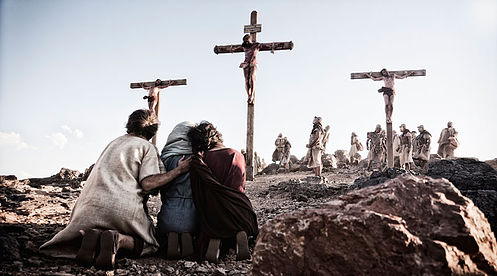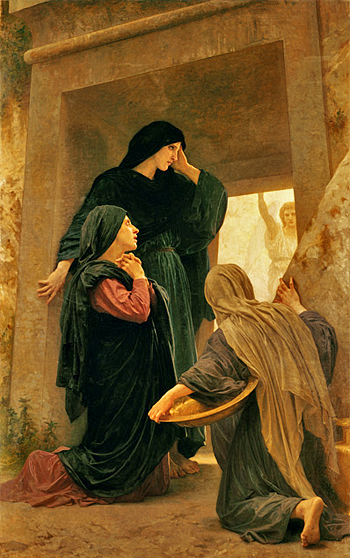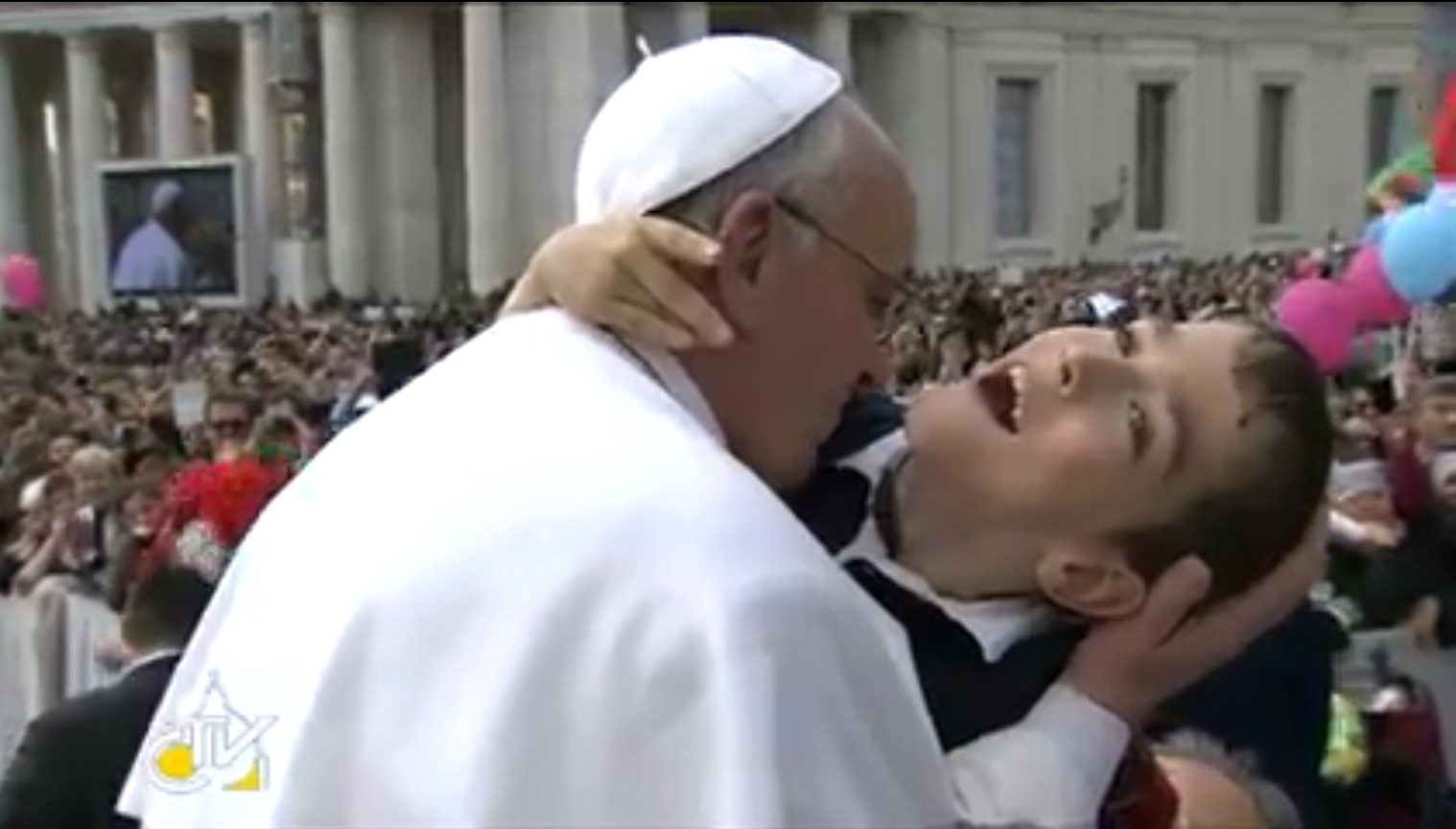
See – Encounter – Pray
Each year on Good Friday night, the Pope presides over a
celebration of the Stations of the Cross at the ancient Roman Coliseum, a
symbol of the history of Christian martyrdom.
This year, in anticipation of the Synod on Youth, Pope Francis invited fifteen
young people between the ages of 16 and 27 to write the meditations. They did
so using a precise methodology. Gathered around a table, they read the accounts
of the passion of Christ from the four Gospels. In other words, they stood
before each scene along the Way of the Cross and “saw” it. Then, after a
certain time had passed, each young person spoke about a detail of each scene
that had struck him or her the most. Three key words, three verbs, mark the
development of these texts: first, as already stated, is seeing,
then encountering, and last, praying. (See meditations here)
 In giving young people, this challenge the Pope was asking that
this two millennia old story be seen with the eager newness of youth. When grow
old when we no longer want to see anything new, we fear what is new, close doors and lack trust and openness.
In giving young people, this challenge the Pope was asking that
this two millennia old story be seen with the eager newness of youth. When grow
old when we no longer want to see anything new, we fear what is new, close doors and lack trust and openness.
To encounter means to change,
to be prepared to set out once more on our journey with new eyes.
To see and to encounter leads, finally, to prayer.
To see and to encounter leads, finally, to prayer.
If you would indulge me for a moment I would like to share with
you, the meditation and prayer of the 11th Station – Jesus is nailed
to the cross.

I see you, Jesus, stripped
of everything. They wanted to punish you, an innocent person, by nailing you to
the wood of the cross. What would I have done in your place? Would I have had
the courage to acknowledge your truth, my truth? You had the strength to bear
the weight of the cross, to meet with disbelief, to be condemned for your
provocative words. Today we can barely
swallow a critical comment, as if every word was meant to hurt us.
You did not stop even
before death. You believed deeply in your mission and you put your trust in
your Father. Today, in the world of Internet, we are so conditioned by
everything that circulates on the web; there are times when I doubt even my own
words. But your words are different; they are powerful in your weakness. You
have forgiven us, you held no grudge, you taught us to offer the other cheek
and you kept going, even to the total sacrifice of yourself.
I look all around and I
see eyes glued to telephone screens, people trolling the social networks in
order to nail others for their every mistake, with no possibility of
forgiveness. People ruled by anger, screaming their hatred of one another for
the most futile reasons.
I look at your wounds and
I realize, now, that I would not have had your strength. But I am seated here
at your feet, and I strip myself of all hesitation. I get up in order to be
closer to you, even if by a fraction of an inch.
To see – to encounter – to pray
This has been our task this Holy Week, on this Easter Day and
throughout our Christian lives which begins in baptism. A baptism which 4 young people will receive
tonight. To see, to encounter and to
pray is what the Holy Spirit whom we received at confirmation who empowers us
to allow our seeing and encountering give rise to mercy, even in a world that
seems pitiless and abandoned to senseless anger, meanness and the desire not to
be bothered.
Today with these women of Mark’s Gospel, we see the tomb of
Jesus, not as expected. We watched the
women make their journey to the place where Jesus’ body had been laid, carrying
spices, oils and everything that was necessary to properly clean, anoint and
bury the dead. Shockingly we see the
tomb as they do, the stone has been rolled away. Has someone broken into the tomb or stolen
the body?
 What we see gives way to an encounter – not at this point with
the risen Lord, but a YOUNG MAN – who is sitting on the right side, clothed in
a white robe. He said to them, "Do
not be amazed!
What we see gives way to an encounter – not at this point with
the risen Lord, but a YOUNG MAN – who is sitting on the right side, clothed in
a white robe. He said to them, "Do
not be amazed!You seek Jesus of Nazareth, the crucified. He has been raised; he is not here. Behold the place where they laid him.”
What we and the women see is now different, no one has broken
into the tomb – SOMEONE HAS BROKEN OUT!
This encounter at the empty tomb begins a change, a movement in a new
direction, that will be empowered all the more when these women, and the disciples,
encounter more than an empty tomb but the resurrected Christ.
Tonight, having witnessed salvation history in the scriptures
proclaimed, having watched the story of Christ passion unfold over these days,
we encounter the Risen Christ, in the Gospel proclaimed, in the conferral of
the Sacraments of Baptism and Confirmation and in the reception of the Risen
Christ in the Holy Eucharist.
Having seen, having encountered, on this Easter night we are
therefore called to pray that we who have seen the suffering and have
encountered Christ might receive the wisdom, courage and the grace we need to
share in the salvific mission to which the Lord calls us.
On Ash Wednesday, the day the Lenten season began, 19 students
and teachers were killed by a shooter at Stoneman Douglas High School in
Parkland Florida. Since that time some
of the young survivors have become very familiar to us. They have appeared all over the media and
have led massive rallies advocating change and have even inspired law makers to
consider legislation that they hope would prevent such violence. Many have been inspired by these young people
and others have taken offense at some of the words, actions and policy
proposals that these young people have advocated.


This tragedy and these subsequent experiences
with the young survivors have impacted the Lenten season for me. We are foolish, if we reject seeing what they
see. No matter what we may feel about
their words or actions, we can’t but help but be awakened to the injustices
they see and to which we have become complacent. Young people see the sufferings of Christ in
a way we sometimes miss. They more
readily see poverty, racism, social inequity and a disregard for human
life. Yet often they don’t see the
resurrected Christ. Their anger and pain
overwhelms them and they can be brought down in despair or overcome by the same
forces they oppose.
So, we are called to see what they see and help them, help this
generation to encounter the resurrected Christ, who conquers all these
things. As church and families, we
witness to Jesus Christ risen from the dead, overcoming all evil. As church we live the words of St. Peter in
the Acts of the Apostles
We are witnesses of all that he did…
They put him to death by hanging him on a tree.
This man God raised on the third day
They put him to death by hanging him on a tree.
This man God raised on the third day
and
granted that he be visible,
not to all the people, but to us…
He commissioned us to preach to the people
and testify that he is the one appointed by God
as judge of the living and the dead.
not to all the people, but to us…
He commissioned us to preach to the people
and testify that he is the one appointed by God
as judge of the living and the dead.
In
their empathy, our young can be lied to, and brought down the devil’s path of
immorality, abusive relationships, destructive decisions and a rejection of the
faith. They need us to respond to their
vision, to help them see that Christ sees what they see by living lives of
faithful witness. Because we have
encountered the risen Christ we must reject hypocrisy, dualism, bigotry and any
lack of compassion. We must be merciful
as the one who willingly died on the cross is merciful.
The greatest experiences I have had in my priesthood are the moments when I
have witnessed the empathetic vision of the young encountering resurrection
faith. The annual March for Life in
Washington, Catholic Scouting, Youth Ministry, Service Retreats and our
seminarians are what happens when the young encounter the resurrected Christ.
How
blessed we are to have these four, young people with us tonight. They have a vision to share
with us, they offer us a perspective that we must see. And we offer to them - Christ
crucified and raised – so that what they see does not end in despair but is
transformed in hope.
Throughout
Lent and this Holy Week, we have seen sin and death. On this Easter Day we encounter Christ raised
and we go forth in prayer and joyful hope.

With the vision of the young who have encountered the Risen Christ, let us pray the prayer which followed the meditation of the 11th Station last night in Rome

With the vision of the young who have encountered the Risen Christ, let us pray the prayer which followed the meditation of the 11th Station last night in Rome
I ask you, Lord, that in the
face of good
I may be ready to recognize it,
that in the face of injustice I may find the courage
to take my life in my hands
I may be ready to recognize it,
that in the face of injustice I may find the courage
to take my life in my hands
and to act differently.
Grant that I may be set free from all the fears
that, like nails, immobilize me and keep me far
from the life you have desired and prepared for us.
HAPPY EASTER
Grant that I may be set free from all the fears
that, like nails, immobilize me and keep me far
from the life you have desired and prepared for us.
HAPPY EASTER















